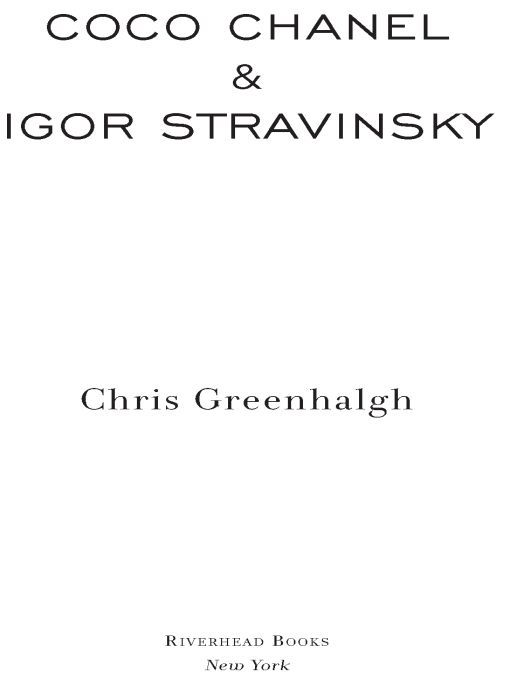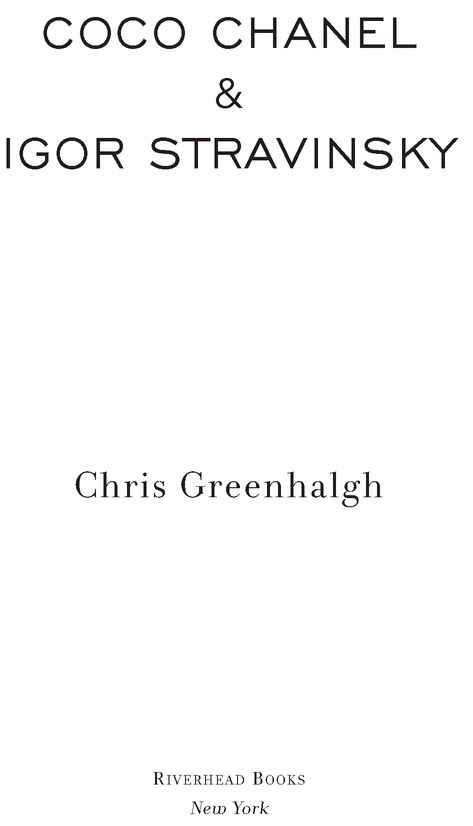Coco Chanel & Igor Stravinsky
Read Coco Chanel & Igor Stravinsky Online
Authors: Chris Greenhalgh


Table of Contents
Â
Â
Â

RIVERHEAD BOOKS
Published by the Penguin Group
Penguin Group (USA) Inc. 375 Hudson Street, New York, New York 10014, USA
Penguin Group (Canada), 90 Eglinton Avenue East, Suite 700, Toronto, Ontario M4P 2Y3, Canada (a division of Pearson Penguin Canada Inc.)
Penguin Books Ltd., 80 Strand, London WC2R 0RL, England
Penguin Group Ireland, 25 St. Stephen's Green, Dublin 2, Ireland (a division of Penguin Books Ltd.)
Penguin Group (Australia), 250 Camberwell Road, Camberwell, Victoria 3124, Australia (a division of Pearson Australia Group Pty. Ltd.)
Penguin Books India Pvt. Ltd., 11 Community Centre, Panchsheel Park, New Delhiâ110 017, India
Penguin Group (NZ), 67 Apollo Drive, Rosedale, North Shore 0632, New Zealand (a division of Pearson New Zealand Ltd.)
Penguin Books (South Africa) (Pty.) Ltd., 24 Sturdee Avenue, Rosebank, Johannesburg 2196, South Africa
Â
Penguin Books Ltd., Registered Offices: 80 Strand, London WC2R 0RL, England
Â
The publisher does not have any control over and does not assume any responsibility for author or third-party websites or their content.
Â
The epigraph from “Dedicatory Poems” is from
Poem Without a Hero
from
You Will Hear Thunder
by Anna Akhmatova, translation by D M Thomas, published by Secker & Warburg.
Poem Without a Hero
from
You Will Hear Thunder
by Anna Akhmatova, translation by D M Thomas, published by Secker & Warburg.
Â
All rights reserved.
No part of this book may be reproduced, scanned, or distributed in any printed or electronic form without permission. Please do not participate in or encourage piracy of copyrighted materials in violation of the author's rights. Purchase only authorized editions. RIVERHEAD is a registered trademark of Penguin Group (USA) Inc. The RIVERHEAD logo is a trademark of Penguin Group (USA) Inc.
Â
Previously published in the UK as
Coco and Igor
by Review Books in 2003
First Riverhead trade paperback edition: December 2009
Coco and Igor
by Review Books in 2003
First Riverhead trade paperback edition: December 2009
Â
Library of Congress Cataloging-in-Publication Data
Greenhalgh, Chris, 1963-
[Coco and Igor]
Coco Chanel & Igor Stravinsky / Chris Greenhalgh.â1st Riverhead trade
paperback ed.
p. cm.
Originally publsihed: London : Review, 2003, under title: Coco and Igor.
[Coco and Igor]
Coco Chanel & Igor Stravinsky / Chris Greenhalgh.â1st Riverhead trade
paperback ed.
p. cm.
Originally publsihed: London : Review, 2003, under title: Coco and Igor.
eISBN : 978-1-101-16294-1
1. Chanel, Coco, 1883-1971âFiction. 2. Stravinsky, Igor, 1882-1971â
Fiction. I. Title. II. Title: Coco Chanel and Igor Stravinsky.
PR6057.R372C63 2010
823'.914âdc22
2009037875
Fiction. I. Title. II. Title: Coco Chanel and Igor Stravinsky.
PR6057.R372C63 2010
823'.914âdc22
2009037875
Â
Â
Â
For Ruth, Saul, and Ethan
And behind it will come a man
Who won't become my husband, yet together
We shall deserve such things
That the twentieth century shall stand agape.
Who won't become my husband, yet together
We shall deserve such things
That the twentieth century shall stand agape.
from
Dedicatory Poems,
Anna Akhmatova
Dedicatory Poems,
Anna Akhmatova
CHAPTER ONE
On the morning of her death, a Sunday, Coco went for a drive.
It was the one day of the week she allowed herself off from the shop. Wrapped in a woolen tweed overcoat against the January cold, she sat by the window behind the chauffeur. The face revealed in the driver's mirror belonged to a woman in her late eighties. Her eyes were scribbled with blood and her lashes long as an ostrich's. Deeply wrinkled, her skin had a swarthy toughness from too much sun and too many cigarettes.
“Where to, Mademoiselle?”
“I don't care. Around.”
Picking up speed, the car achieved an even hum on the cobbles. Dwarfed in the backseat, Coco was conscious of the empty space around her. A smell of leather rose from the seats. She felt their coldness penetrate her bones.
“Disgusting, isn't it?” the driver said.
“What?”
He gestured with both hands: “This.”
Coco muttered as she put her glasses on. Outside, she registered an untypical stillness. Trees hovered remote as ghosts. Bells rang flatly from the Madeleine, answering in widening circles of sympathy the damp sound of church bells around the center of Paris.
Slowly she noticed something shocking. The streets were strewn with the bodies of dead birds. Pigeons, mostly. With alert, nervous movements, she glanced first through one side window and then the other. Her face broadened like a shadow as she spoke. “Stop! I want to get out.”
The chauffeur pulled over. His peaked hat slid against the ceiling as he hurried to help her from the car. Though sprightly for her age, she was still frail enough to require the support of the young man's arm in stepping onto the pavement.
Her eyes blinked quickly as she gazed around. The avenue was littered with the stiffening, horny-toed corpses of birds. Limp-winged, predominantly gray, with dabs of lilac and rhythms of iridescence in bands around the necks, there they layâtheir heads to one side and their beaks slightly open. Feathers from the wings of one bird flapped slackly close to Coco's foot.
“My God!” A ripple of disgust ran through her. For an instant, she felt faint.
Beyond she witnessed a scene of even greater carnage. The dried-up bowl of a fountain was choked with the ragged bodies of dead birds. More mute lumps of feathers asterisked the sandy paths.
“What happened?” she asked, both puzzled and upset.
“The mayor ordered a cull. They were filthying the city, flying into windscreens, spreading disease . . . ,” the young man answered matter-of-factly. “It was in the newspapers,” he offered, careful not to imply any rebuke.
“But how . . . ?” Her arm attempted to include the scale of the massacre in its sweep.
“They put poison in the basins of the parks overnight,” the driver went on. “Just strong enough to kill the pigeons.” He rubbed his black-gloved hands together. Wearing a thin liveried suit from the Ritz, he was beginning himself to feel the chill. Seeing her hungry for more information, he added, “They chose Saturday night so the streets could be cleaned up easily on the Sunday.”
Coco noticed for the first time the small army of street-cleaning vehicles already humming about the empty city center. She watched men in pale blue overalls going about the grisly business of sweeping up the dead birds. They looked, she thought as they raked them in, like gruesome croupiers.
Her limbs went watery, and she clung to a railing to steady herself. Little flecks of rust rubbed off on her gloves. A voice spilled from inside her head, a self-directed chatter, a high insistent hum like tinnitus in her ears.
“Mademoiselle?” The driver tilted his head to listen, but guessed correctly that the words were not for him.
Her thoughts had bent elsewhereâtoward Igor and his collection of birds. How he'd grieve to see such destruction, how he'd be appalled.
She was startled to discover how much she missed him, even now. She had seen her partners die off one by one to leave her old and unaccompanied. But he was still alive. Odd, she pondered, how they had both survived when almost everyone else had gone. She remembered with tenderness that summer they spent together in her villa, Bel Respiro. Fifty years ago now.
She was surprised to experience an acute sense of loss. A feeling of emptiness possessed her. For a second everything around her seemed so hollow she guessed that, tapped, the world might ring.
The driver stood there patiently, awaiting her next whim. “Mademoiselle?”
Absently, “What?”
Recalled to the present, she saw the trees withdrawn to a twiggy thinness and heard the silence now that the bells had ceased. She grimaced as the odor of decay reached her nostrils. “I'm cold,” she said with a sudden shiver. Her fingers were numb inside her gloves. Pulling her coat close about her, she indicated with a quick movement her wish to return to the car.
As they raced away from the curb, she struggled to fix her jiggling image in the mirror of her compact. “Slow down!” she muttered. “What's the hurry?” That buzz again inside her head like a wasp inside a jar.
On a day that seemed robbed of it, she felt an urgent need for color. Even the normally gaudy advertisements seemed bleached of their high gloss. Shakily she maneuvered her lipstick across the taut line of her mouth. Painted a vivid red, her lips made a small bright space in the morning. As she peeled off her gloves, though, she saw her fingers, stringy and distinctly gnarled. Repulsed, she looked at them as though they were claws, as though the liver spots that afflicted them were a kind of leprosy.
Coco loathed being old. It was the inevitability of it she hated, the sheer relentlessnessâlike the leaves turning brown, or the cold coming. Effortlessly feminine all her life, she felt at this instant less like a woman and more like just another parcel of skin and bone poised to rejoin the earth. It had all happened so rapidly. Her life was a blur, and had rushed by like the city now pouring past the window of her car.
They returned swiftly to the Ritz, where Coco kept her own suite of rooms. The chauffeur escorted her through the broad revolving doors.
“I can manage from here,” she said, dismissing him. “I'm not a cripple.”
With a look of contending tolerance and respect, the young man touched his cap and returned to the car outside. Coco felt the change of temperature as the warm air touched her face. She walked on through the foyer, where a vacuum cleaner moved in giant arcs across the floor. She took care not to snag her feet in its wire.
“Good morning, Mademoiselle Chanel,” declared the receptionist above the din. Warily, and without looking around, she raised a hand in acknowledgment. The wire, she knew, was all part of a conspiracy to trip herâlike the slippery beeswax and the rugs they kept adjusting in her room. They were all out to get her, she was convinced. She smiled at the thought that she had thwarted them again. Another attempt to kill her hindered.
As she walked on toward the elevator, the stench of the Grill Room hit her. Asparagus, this time. And if it wasn't asparagus, then it might be tarragon, or garlic. It always reeked of something. She blamed the maître d. He did it deliberately, she was certain. She'd told him several times how dreadful it was having to smell other people's food. He never listened. It was his way of assaulting her, she decided; his strategy for forcing her out.
Like an avid mouth, the lift doors slid open. Behind her they sucked shut.
By this time Coco's maid, Céline, had arrived and was busy making her mistress's bed. The key scratched in the lock and Coco opened the door to her room. Standing to attention, the maid wished her good morning. Without stopping, Coco looked her up and down.
Other books
Noah's Ark: Survivors by Dayle, Harry
Firewalker by Josephine Angelini
The Union Jack by Imre Kertész
Tricksters Queen by Tamora Pierce
The Denial of Death by Ernest Becker
Warriors: Dawn of the Clans #1: The Sun Trail by Erin Hunter, Wayne McLoughlin
Los Cantos de Hyperion 5 - Huérfanos de la Hélice by Dan Simmons
End Online: Volume 1 by D Wolfin
Dreams in the Key of Blue by John Philpin
Alec the Wanderer: Generations of Eredwynn #4 by Daniel B. Harris
